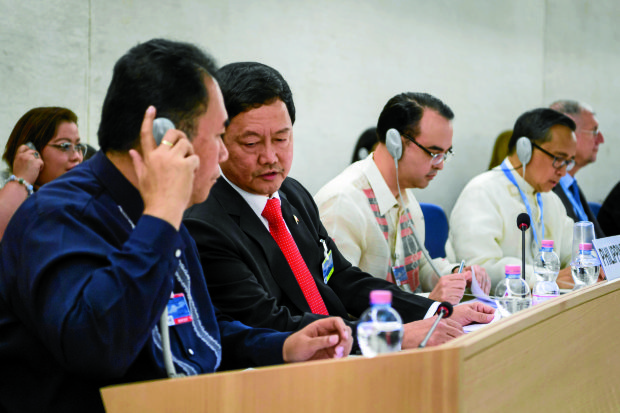PH notes UN worries, mum on commitment

RIGHTS REVIEW Philippine government officials led by Menardo Guevarra face the United Nations Human Rights Council during its review of the Duterte administration’s human rights record as it carries out its war on drugs. —AFP
The Philippines said on Friday that it would review recommendations over killings in its war on drugs, but did not commit to make reforms or prosecute the police for excessive use of force after receiving criticism from UN rights council members.
President Rodrigo Duterte has been widely condemned in the West for failing to curtail the killings and address activists’ allegations of systematic, state-sponsored murders by police of drug users and dealers, a charge which the authorities reject.
The United Nations Human Rights Council examined the Philippines’ record this week, where the government delegation insisted there had been no new wave of killings prompted by the campaign, and denounced what it branded as “alternative facts.”
Since Mr. Duterte took office 10 months ago, there have been 9,432 homicide cases, including 2,692 deaths from “presumed legitimate law enforcement operations,” it said.
The council adopted a report on Thursday comprising 257 recommendations from 95 states, roughly half voicing concern over the killings, and told the Philippines to report back “with a clear position” at its September session.
Among them was a recommendation from the United States to “ensure that all counternarcotics operations are conducted in conformity with constitutional protections and international human rights obligations.”
Sen. Richard Gordon, a staunch ally of the president, said the government should listen to the recommendations.
“To the best of our ability we tried to explain the underlying reasons for this campaign. That is to protect the human rights of the majority of our people who stand to potentially suffer the dark consequences of unmitigated abuse of illegal drugs and to set an environment conducive to further social economic development,” Menardo Guevarra, senior deputy executive secretary in Mr. Duterte’s office, said on Thursday.
The Presidential Human Rights Committee would “review and determine what actions to take on your numerous recommendations,” Guevarra told the forum.
“The international community sent out a very strong message to the Philippines government today … Many of the recommendations did address the extrajudicial killings, arbitrary detentions vis-a-vis the government’s campaign to stamp out illegal drugs,” council spokesperson Rolando Gomez said.
Nearly 50 states had voiced concerns, “so that obviously speaks volumes, and now of course it is up to the government to make good on the promises [to which they] committed here,” Gomez told Reuters Television.
China, which during the debate congratulated Mr. Duterte’s administration on its “remarkable achievements” in protecting human rights, suggested in its recommendation that it should “address the root cause of illegal drugs through development.”
Philippine National Police Director General Ronald Dela Rosa on Friday said only the President could order a freeze to the campaign, following a call from Volunteers Against Crime and Corruption (VACC) to suspend it amid UN concerns.
VACC said the police must suspend the drug war due to the increasing number of cases of “tanim-droga” of policemen “planting drugs as evidence” against their would-be victims.
But reacting to the suggestion, Dela Rosa said: “You tell it to the President because we are just following orders.”
“If the President says ‘stop,’ then we will stop. I have no power to say ‘go’ or ‘no go.’ It’s the President’s order,” he stressed.
The PNP in early March relaunched its antidrug effort, about a month after the President ordered police to stop the campaign after rogue policemen were implicated in the kidnap-slay of South Korean businessman Jee Ick-joo inside Camp Crame last year.
In Hong Kong, where Mr. Duterte is on an official trip, Trade Secretary Ramon Lopez said that the 10-nation Association of Southeast Asian Nations (Asean) bloc continued to support the drug war.
“Actually all of them, if you talk to the Asean counterparts, the leaders, heads of state, they’re in full support of the drive, the campaign against drugs,” Lopez told reporters.
He stressed that the government “does not sanction human rights violations,” a message that Senator and incoming foreign secretary Alan Peter Cayetano had explicitly conveyed to the United Nations.
Lopez said only President Duterte “had the guts” to implement and impose tough measures against drugs, which he stressed had affected 4 million Filipinos.
“The leaders are in full support. Because I think they think that way also, in their countries, they are solving it that way,” he said. —WITH A REPORT FRROM REUTERS














